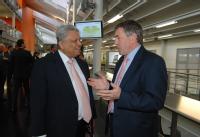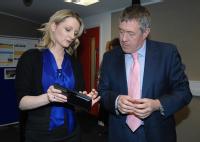Skills Secretary visits WMG
PR 04/09
27 March 2009
SKILLS SECRETARY VISITS WMG ON JOBS FOR THE FUTURE TOUR
Skills Secretary John Denham will meet West Midlands business leaders at WMG’s new Digital Lab today (Friday 27 March) to discuss how local people can benefit from growth industries that will help the UK emerge stronger from the economic downturn.
Mr Denham will tour some of the West Midland’s facilities and businesses in high value manufacturing before holding talks with business leaders, training organisations and development agencies at WMG’s facilities at the University of Warwick.
He will discuss how Government and businesses can make sure the region can make the most of its strengths as the UK comes of the downturn and how the Government’s real help now to individuals, families and business is filtering down across the West Midlands and what more can be done.
The visit is part of a nationwide tour by Mr Denham to regions to highlight industries with potential to ensure better future prospects and employment including:
-
Clean technologies, particularly low carbon technologies including nuclear;
-
Healthcare and the life sciences;
-
High value manufacturing;
-
The creative industries;
-
High value added services;
-
Emerging technologies such as nano-technology and plastic electronics.
Mr Denham said: “Like areas across the UK, the West Midlands is experiencing tough times. That’s why the Government is taking action to provide real help now to individuals, families and businesses by stabilising the banks, opening up lending and increasing access to training for those unemployed or worried about their jobs.
“But as well as providing immediate help we must look further ahead to what else we can do to ensure we emerge from this recession stronger.
“One of the things Government can do is to identify in what areas of the economy there is significant potential for economic growth at both a regional and national level. Clean technologies and energy, including nuclear energy and low carbon technologies, make up one of those areas and in the West Midlands are a real strength.
“I want to tap into that success to find what Government can do working alongside industry, researchers and the educational sector to help new firms grow and people get the skills they need to win the jobs these new businesses will create.”
Across the West Midlands, the high value manufacturing sector employs 330,000 people and accounts for 14 per cent of total employment within the region.
In 2006 it generated £14,567 million of Gross Value Added (GVA), and is the region’s second largest sector in terms of GVA - behind only the business and professional services sector.
Mr Denham will hold a meeting with business leaders, training organisations and development agencies to discuss:
· how the West Midlands can get the best of Government funded research;
· how local people can get the skills and training they need to win the jobs these industries are creating at all levels;
· what role Government can play in helping to achieve both of these things at both a local and national level.
The meeting will be hosted by Professor Lord Kumar Bhattacharyya, Director and Founder of WMG, an academic department of the University of Warwick focusing on delivering innovative solutions to industry through advanced research and education programmes.
Professor Lord Bhattacharyya said: “It is only through focusing on the future that we will get through this downturn. We have excellent skills and technological expertise in the West Midlands but this must be supported now in order to come out of the current situation strong enough to cope with the demands of the future economy.”
John Denham said: “By speaking with professionals at the frontline of business, research and training in the West Midlands and across the country I believe we can inform a new industrial policy.
“Through industrial activism we can target support for research and innovation in growth industries, anticipate the future demand for skills, open access to funding and scrap unnecessary bureaucracy.
“It’s only by taking action now that we will avoid the mistakes of the last recession and make sure the West Midlands and the UK as a whole emerges stronger from the downturn and can take advantage of the upturn when it comes.”
Notes to editors
1. To attend one of the media facilities or photo calls during the visit or to request an interview with Mr Denham, call Josh Coe in the DIUS press office on 07799 828388.
2. For more details on what the Government is doing to provide real help to individuals, families and businesses in the downturn, including in the regions, visit: http://www.realhelpnow.gov.uk/
3. The West Midlands visit is the final leg of a four day tour taking in London (Creative Industries, March 24), the North East (Healthcare and the Life Sciences, March 25) and the North West (Clean Technologies, March 26).
4. The six industries have certain common features:
-
They are markets or sectors which play to the UK strengths – either where we already have nascent industries; research strengths or which build on our knowledge-based economy;
-
They are industries which we know have the potential for significant growth in the coming decades and therefore the potential to generate significant British jobs;
-
There is potential for Government action to be effective in helping generate economic growth in these areas.
Clean technologies: responding to climate change through wind, solar and nuclear power and the creation of low carbon technology for cars and buildings.
Health and life sciences: looking after an ageing population, strengthening our world class drug firms, supplying our NHS.
High value added manufacturing: Britain building on our strengths in high value manufacturing such as aerospace and cars – and creating the technologies that more industries will depend on to build the products and goods of the future.
The creative industries: taking advantage of English as the language of the world, building on our IT and mobile communications expertise and supporting our creative and digital industries.
High value added services: drawing on the UK expertise in areas such as civil engineering, financial services and ICT.
Emerging technologies: using the country’s science and research base to realise opportunities in the new and emerging technologies that will be a feature of future life – such as nano and plastic technologies.
5. The visits pick up themes outlined by John Denham in a recent speech when he called for a smarter approach to funding research if the UK is to stay ahead. For details go to: http://www.dius.gov.uk/news_and_speeches/press_releases/funding_research
6. For more information on the work of DIUS and to view press notices, speeches and press office contacts go to www.dius.gov.uk
7. WMG, an academic department of the University of Warwick, is a provider of innovative solutions to industry, supporting some of the most advanced research, development and training projects in the world. For more information go to www.wmg.warwick.ac.uk


